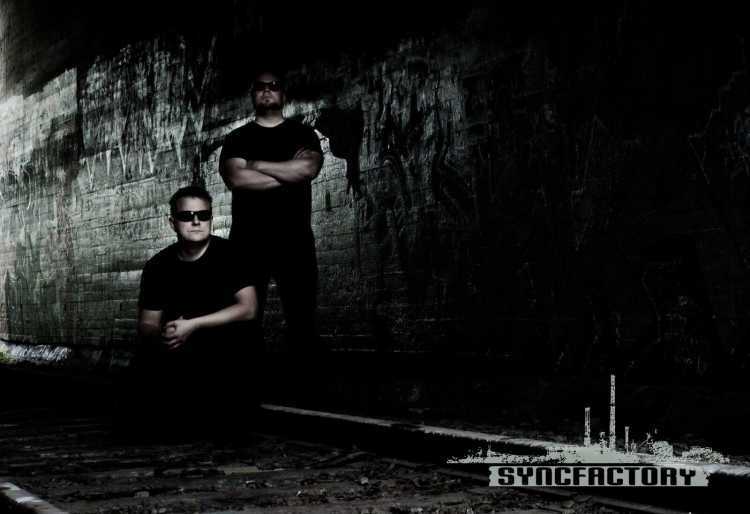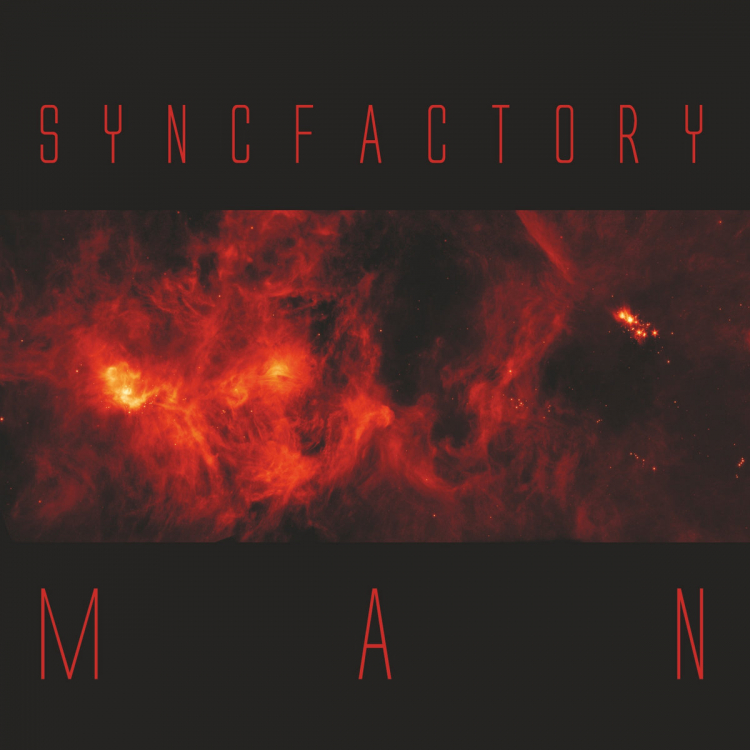
Hello SyncFactory and welcome to Brutal Resonance! Since this is your first time on the site, let’s start off with the basics. Give us three of your favorite albums of all time and tell us why you like them so much.
Mika: First of all, thank you for this interview. It's hard to say my favourite albums because so many good albums are out there. But to my mind comes immediately three albums from the past. These albums brought me into this scene at the very beginning and these are at the tope of my list, of course. These just hit me like one-ton hammer. Fortification 55's "Anthropology", Leaether Strip's "Solitary Confinement", and Frontline Assembly's "Caustic Grip".
Petri: As Mika said, it is almost impossible to name my top three; even a top hundred would not be enough to cover all the important ones. But when limiting to the old albums that got me interested in this genre, I can almost go with Mika's list, those are all classics. I'll just switch "Solitary Confinement" to Front 242's "Tyranny For You".
“MAN” is your latest album that released on Insane Records. I would like to discuss this on a song-by-song basis starting with ‘Nihil’, ‘Under the Sun’, and ‘Obey the Strain’. They have been described as scrutinizing human existence. What about humanity do each of those songs dissect? What was your message?
Mika: I want to thank Insane Records who have made awesome releases. All song lyrics are written by Petri, so maybe Petri can explain the meanings behind these songs a bit better and deeper.
Petri: As a general note, the writing process of this album was a bit different than before. With most songs, a demo version of the song was written first, and then the lyrics were written from scratch for it. It was important to get the syllable count and rhythm to fit and, as always with lyrics, to make the text easily singable. That, of course, sets limitations to waxing poetic. Hence most of the texts are first and foremost lyrics to a particular song, they are not really independent pieces of literary art.
That said, all the lyrics do have a theme, and they also follow the generic theme of the album, ‘Man’. The questions already tell what each song's theme is, and with such short texts it is a bit hard to elaborate further, but I'll do my best. Any text can also have many interpretations, and I believe no writer should set in stone in great detail what a work of fiction she has written means. I try to give background information on the writing process of the texts instead.
'Nihil', ‘Under the Sun’, and ‘Obey the Strain’ all take a nihilistic look at human life on Earth. What really is the point of it? All three combine a cosmic perspective with a personal one. One interpretation could be that while from a cosmic viewpoint everything is meaningless but from a personal perspective that may not be such a bad thing. "It's a boon, not a bane."
While the previous three talked about human existence, ‘Whispers’ takes a look at the unreliability of human communication. What did you mean by that? I have a feeling the theme is more than just people having bad cell phone service.
There are only two ways a person can learn things, by experience or by reading or hearing things. A vast majority of things are learned by the latter method. Unfortunately that is a very unreliable way. The first problem is the same that happens in the children's game Chinese whispers; in a sequence of repetitions of a story, or a piece of news, each repetition differs slightly from the original, and at some point bears only a scant resemblance to the original. Second problem is that people may purposefully give false information, either by telling outright lies, or by omitting important details. If mass media does this — or people believe it does — people will turn to alternative "news" sources, and the result is a post-factual world. The third problem is that things can get misinterpreted, for example due to lack of context or due to confirmation bias. ‘Whispers’ is mainly about the first and third problem.
‘Mt. Nowhere’ and ‘Show Time’ home in on three ideas: meaningful existence, personal goals, and vanity. Are these songs meant to criticize humanity or are they meant to contain some type of hope? Personal goals do not sound like a bad thing.
‘Show Time’ is about people who work very hard to become famous, and then suffer from the unwanted by-products that come with the fame. One inspiration for the text was the heart-breaking South Korean celebrity suicides. It would appear unfathomable that so many beautiful, talented, young and famous people would want to take their own life. But according to interviews and messages left behind, the celebrities were suffering from intense pressure, unprotected privacy, and malicious comments.

‘Astronaut’ takes things a little different as it examines the relationship between man and god. What brought about this song? Why did you feel it necessary to dive into religion?
Petri: The classical conflicts in story telling are about man versus nature, man versus man, and man versus god. This is just one take on the latter. However, the text can also be interpreted to be about a relationship between two lovers.
I read that ‘Demimonde’ was inspired by depression. Does this song reflect personal experiences that you can share with us?
The title track of the album ‘Man (Farewell)’ explores the relationship between two humans in contrast to the nature of ‘Astronaut’. What happens in this relationship? What story is told in this song?
‘Vigil’ seems to be another song written from personal perspective as it deals with insomnia. What inspired this track?

The last song on the album, ‘Hunger’, seems to fall in the realm of science fiction as it explores the measures people take to lengthen their own lives. Was this song based on actual events or is it merely a work of fiction?
What else have you in store for the future? Will you be working on any new album, EPs, singles, or remixes?
Lastly, I would like to thank you for your time. I leave the space below for anything else you may wish to mention. Cheers!
Petri: Thank you very much for the interview, and all the best for the future!
This article was commissioned through our Ko-fi page. Feel free to check it out for review, interview, and premiere opportunities.

Steven Gullotta
info@brutalresonance.comI've been writing for Brutal Resonance since November of 2012 and now serve as the editor-in-chief. I love the dark electronic underground and usually have too much to listen to at once but I love it. I am also an editor at Aggressive Deprivation, a digital/physical magazine since March of 2016. I support the scene as much as I can from my humble laptop.
Share this interview
Facebook
Twitter
Google+
Shares
Popular interviews
Psyclon Nine
Interview, Mar 24 2017
Night Runner
Interview, Oct 13 2016
Testube
Interview, Apr 02 2022
Kite
Interview, Feb 10 2017
God Destruction
Interview, May 17 2016
Related articles
Syncfactory
Interview, Jan 15 2017
Cryogenic Echelon - 'Fall Of The Reptiles'
Review, Feb 19 2012
The Deity - 'The Darkside Chronicles'
Review, Jun 19 2012
Sleetgrout - 'Try To DIe'
Review, Jun 22 2014
PulsR - 'Dreary Land'
Review, Feb 03 2021



